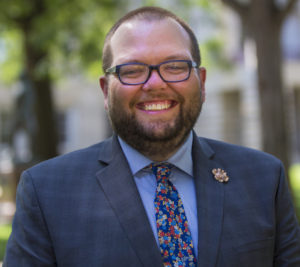
ANALYSIS | By Dave Vieser
Nov. 4. The first sign that an upset in Cornelius was a real possibility occurred shortly after 7:30 on Election Night when Early Voting results showed the challengers ahead, led by former Commissioner Dave Gilroy. Up until that time, there had been speculation that residents were unhappy with the incumbents, but as the precinct results came in, it became clear that this unhappiness was being translated into votes for the challengers.
What really happened? And why? Political analyst Andy Yates may have identified a likely reason.
Sending a message

Andy Yates
”I see a lot of similarities between what happened in Cornelius and Huntersville. The top four candidates in Cornelius—Todd Sansbury, Michael Osborne, Colin Furcht and Gilroy—ran as a slate calling for a moratorium on growth while the top three candidates in Huntersville were outspoken against the proposal for redeveloping downtown and a new Town Hall,” Yates said.
“Voters sent a strong message in both towns in favor of more managed and controlled growth,” he added.
Indeed, there’s no doubt that many voters were unhappy with the incumbents and the many large developments approved during the past year, but no one knew whether that unhappiness would be reflected at the ballot box.
Now we know.
The Law of Unintended Consequences
Of course, the defeat of the four incumbents will have some unintended side effects:
• The only black commissioner, Thurman Ross, was defeated. It’s the second time Ross was voted off the board. The first time around, he regained his seat two years later.
• The board’s only female commissioner, Tricia Sisson, was also defeated, so there will not be a woman on the board
• Dr Mike Miltich who was the top vote-getter in a previous election, also lost. Miltich had been serving as chairman of the Charlotte Regional Transportation Planning Organization (CRTPO).
Will his loss hurt Cornelius?
Miltich thinks so. “Cornelius has now lost its voice on transportation initiatives,” he said.
CRTPO weighted votes favor Charlotte
However, CRTPO uses a weighted voting system, such that Charlotte has roughly three fifths of the total votes in the first place. Even if Davidson, Cornelius and Huntersville were to group together on the CRTPO, they could not overturn the Charlotte contingent—witness the I-77 toll lane votes five-plus years ago.
Also, the chair is the titular leader who represents the entire body; he or she normally does not push a local agenda.
Of course, Cornelius will continue to be represented on CRTPO.
That said, the early information and easy access to the players at CRTPO meetings present while Miltich was chair was always helpful.
Mayoral details
Mayor Woody Washam, who ran unopposed, collected over 3,800 votes. However, there was also a three-fold increase in the number of write-ins by percentage. Were residents trying to send him a message?
The Mayor, who supported the incumbents, chose to take the high road in his post election comments.
“Thanks to our commissioners for their service to our town and congratulations to our incoming board, Dave Gilroy, Todd Sansbury, Mike Osborne, Colin Furcht and Denis Bilodeau, for running great campaigns.Our citizens have spoken and I look forward to working with all to make our town the best it can be. ”
Development time-out
The winning team pledged to invoke a time out on development once they take office. Whether this actually occurs—perhaps in the form of a moratorium—remains to be seen. Its legality may be challenged.
However, there’s no doubt that a new day has dawned at Town Hall. The winners will need to remember that the incumbents lost because they refused to listen to the voters.
The same could happen to them two years down the road if they do not.




